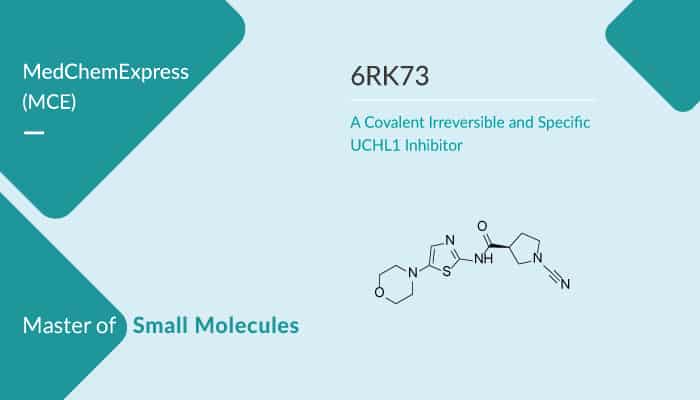Approximately 90% of breast cancer-related deaths are due to metastasis. During the metastasis process, epithelial-mesenchymal transition (EMT) plays an important role. The secreted cytokine transforming growth factor-β (TGFβ) can induce it. Breast cancer has multiple subtypes with distinct metastatic potential based on genetic and clinical features. The most aggressive subtype of breast cancer is triple-negative breast cancer (TNBC). Thus, there is an unmet need for newer molecular targets and effective drugs against these novel targets. Ubiquitin is mediated by ubiquitin E3 ligase enzymes and reverted by deubiquitinases (DUBs).UCHL1 is highly active in the more aggressive breast cancer subtype. Functionally, UCHL1 promotes TGFβ-induced breast cancer metastasis. Furthermore, in exosome fractions of aggressive breast cancer patient sera increase UCHL1 levels. In this study, 6RK73 is a covalent irreversible and specific UCHL1 inhibitor with an IC50 of 0.23 µM. It also shows almost no inhibition of UCHL3 (IC50=236 µM).

6RK73 shows potent inhibition on UCHL1 activity in MDA-MB-436 cells by TAMRA ABP assay. 6RK73 treatment of MDA-MB-436 cells displays strong inhibition of the TGF-induced pSMAD2 and pSMAD3. Furthermore, 6RK73 shows a decrease of TβRI and total SMAD protein levels. Taken together, 6RK73 showed specific inhibition of UCHL1 activity and TGFβ/SMAD2 and SMAD3 signaling, and potent inhibition of breast cancer migration and extravasation. Besides, 6RK73 displays a potent inhibition of breast cancer extravasation in zebrafish.
In summary, UCHL1 plays an important role in breast cancer migration and extravasation by upregulating TGFβ signaling. It highlights a potential novel therapy for cancer treatment by targeting UCHL1. Thus, 6RK73 may provide a new choice for the development of a clinical drug for targeting UCHL1 activity in the treatment of aggressive breast cancer and other UCHL1 overactive cancers.
Reference:
Liu S, et al. Clin Cancer Res. 2019 Dec 19. pii: clincanres.1373.2019.